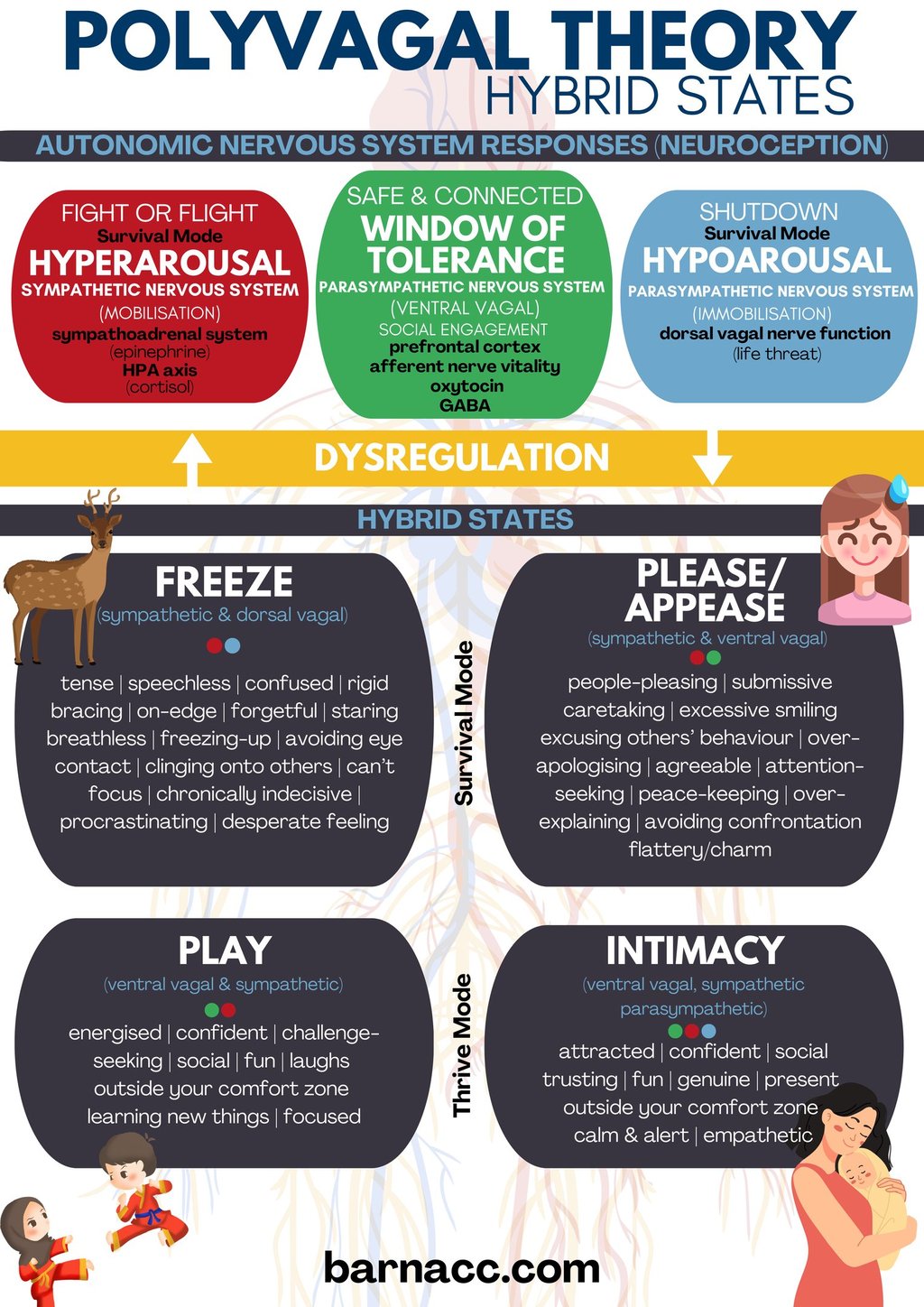Understanding Hybrid States
Nuances in Polyvagal Theory
POLYVAGAL THEORYNEUROSCIENCESTRATEGIES
Emil Barna
11/11/20244 min read


If you want good relationships, you better become interested in how both your mind and body operate.
Polyvagal Theory, developed by the psychological scientist Stephen Porges, explains how your nervous system responds to different situations and offers great insights into how you can build healthier, more connected relationships with others. (For more on this theory, check out this blog post, where I go into it in a bit of depth) Today, I'm going to go into what hybrid states (namely, 'Freeze' and 'Please/Appease') mean for your nervous system, and what to do with this information!
How Your Nervous System Helps You Connect
Your nervous system (brain, spinal cord, nerves) plays a crucial role in how you bond. Through a process called 'neuroception' (literally, neurological perception: Scanning and assessing your environment for danger through various brain cells—called neurons—and reporting back to the body), it registers signals of safety, alertness, and stress. According to Polyvagal Theory, we each have three primary nervous system states:
Ventral Vagal State—you feel calm and safe and connected.
Sympathetic State—you feel tense and ready to act, or defensive.
Dorsal Vagal State—you feel numb or disconnected or shut down.
When more than one of these states collide, you're in what's called a 'hybrid state.' In these states, you might feel alive, connected, energised, and safe; or frozen, disconnected, disengaged, and terrified. Your nervous system navigates these states naturally—they are, you could say, a 'button' pressed for when it's needed most—but for many of us, stress, trauma, or past attachment issues can disrupt our ability to stay balanced.
Attachment & Hybrid States
Attachment science shows that early relationships shape how our nervous system responds to others. If you've experienced love and safety growing up, you might find it easier to trust and connect. However, if you've faced unpredictable trauma or harm, your nervous system might lean toward protective states at their extremes.
Freeze is when your nervous system feels trapped and overwhelmed. You feel frozen in place, can't think clearly, can't respond, and can't feel your emotions fully. It happens when both the sympathetic (fight-or-flight) and dorsal vagal (shutdown) parts of your nervous system are activated. This medley creates a state of high tension and numbness at the same time.
In social situations, freezing happens when you feel trapped in conversation, pressured to respond, or when overwhelming emotions take over. It's your body's way of protecting you by conserving energy while keeping you safe. At the same time, makes you feel disconnected from yourself and others. Because it's hard to connect when you’re in a freeze state, people might interpret your silence or lack of response as disinterest. This is tricky because it creates distance or misunderstanding. Reliance on freeze as a response makes it hard for you to feel present especially if you shut down whenever things get emotionally intense.
Let's turn to the next hybrid state: Please/Appease. This state sees the ventral vagal (social engagement) and sympathetic (alert) responses combine. You want to make others happy but you put your own needs or opinions aside. Anything to avoid conflict. It's like a softer version of 'Fight-or-Flight' where instead of fighting back or running away, you try to make peace by agreeing and over-apologising and acting in ways that don't feel true to yourself.
This state can be triggered when you're around people whose reactions feel unpredictable, or when keeping quiet or making others happy has historically kept you safe. While it smooths over uncomfortable situations temporarily, relying on please/appease leads to resentment and a lack of authenticity in your relationships. When you're constantly trying to keep others happy, you're not giving them a chance to get to know the real you. Frustration, low self-esteem, and burnout are inevitable.
Grounding Techniques to Release 'Freeze' and 'Please/Appease'
When you notice yourself freezing, try first to physically ground. Press your feet into the floor, wiggle your toes, squeeze your hands. These simple actions send your brain signals that you're in control, that you're safe. Taking slow, deep breaths can also help bring your nervous system out of freeze, letting you feel present again. Check out a heap of strategies I've put together here.
Once you're grounded, consider the following strategies:
1. Set Boundaries: Start small. If someone asks you to do something, say "Let me think about it." This gives you time to check in and decide if you really want to do it.
2. Practice Saying "No": Try saying "No" to something small, or share an opinion you might usually keep quiet. This helps rewire your nervous system to see disagreement as safe, which can reduce the urge to please.
3. Create a "Safe Phrase" for when you Freeze: Develop a phrase you can use when you feel frozen. It might be as simple as “I need a moment” or even a code word that people know means you want a break. This lets others know you're not ignoring them and gives you time to reconnect with yourself.
4. Use Eye Contact: When you want to connect more deeply, maintaining gentle eye contact and offering a warm smile helps communicate safety and presence. This invites the other into a connected, ventral vagal state. Eye contact triggers oxytocin (the "bonding hormone") and encourages a feeling of being seen and valued.
When Therapy Helps...
If connecting with others feels hard or scary, therapy might help. Attachment wounds, past traumas, and chronic stress can make it hard for your nervous system to feel safe. Therapy helps by gradually retraining the nervous system and allowing you to experience connection as safe and fulfilling. Therapists help you explore why your body reverts to certain states (e.g. Freeze or Please/Appease) or why other states might feel out of reach or overwhelming (e.g. Play or Intimacy). It can be a powerful tool to heal past attachment wounds, retrain your nervous system, and help you experience relationships in a whole new way.
Location
16 Playwright Street,
Clyde North, VIC 3978
